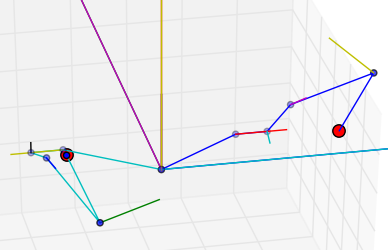A live demo of what IKpy can do : (click on the image below to see the video)
Also, a presentation of IKPy : Presentation.
With IKPy, you can :
- Compute the Inverse Kinematics of every existing robot.
- Define your kinematic chain using arbitrary representations : DH (Denavit–Hartenberg), URDF standard, custom...
- Automaticly import a kinematic chain from a URDF file.
- IKPy is precise (up to 7 digits) : the only limitation being your underlying model's precision, and fast : from 7 ms to 50 ms (depending on your precision) for a complete IK computation.
- Plot your kinematic chain : no need to use a real robot (or a simulator) to test your algorithms!
- Define your own Inverse Kinematics methods
Moreover, IKPy is a pure-Python library : the install is a matter of seconds, and no compiling is required.
You have three options :
-
From PyPI (recommended) : Simply run :
pip install ikpy
If you intend to plot your robot, you can install the plotting dependencies (mainly matplotlib) :
pip install 'ikpy[plot]'- If you work with Anaconda, there's also a Conda package of Pypi :
conda install -c https://conda.anaconda.org/phylliade ikpy
-
From source : First download and extract the archive, then run :
pip install ./
NB : You must have the proper rights to execute this command
Follow this IPython notebook.
Go the the wiki. It should introduce you to the basics concepts of IKPy.
An extensive documentation of the API can be found here.
The library can work with both versions of Python (2.7 and 3.x). It requires numpy and scipy.
Sympy is highly recommended, for fast hybrid computations, that's why it is installed by default.
Matplotlib is optional : it is used to plot (in 3D) your models.
IKPy is designed to be easily customisable : you can add your own IK methods or robot representations (such as DH-Parameters) using a dedicated developper API.
Contributions are welcome : if you have an awesome patented (but also open-source!) IK method, don't hesitate to propose for adding in the lib!
- If performance is your main concern, aversive++ has an inverse kinematics module written in C++, which works the same way IKPy does.




